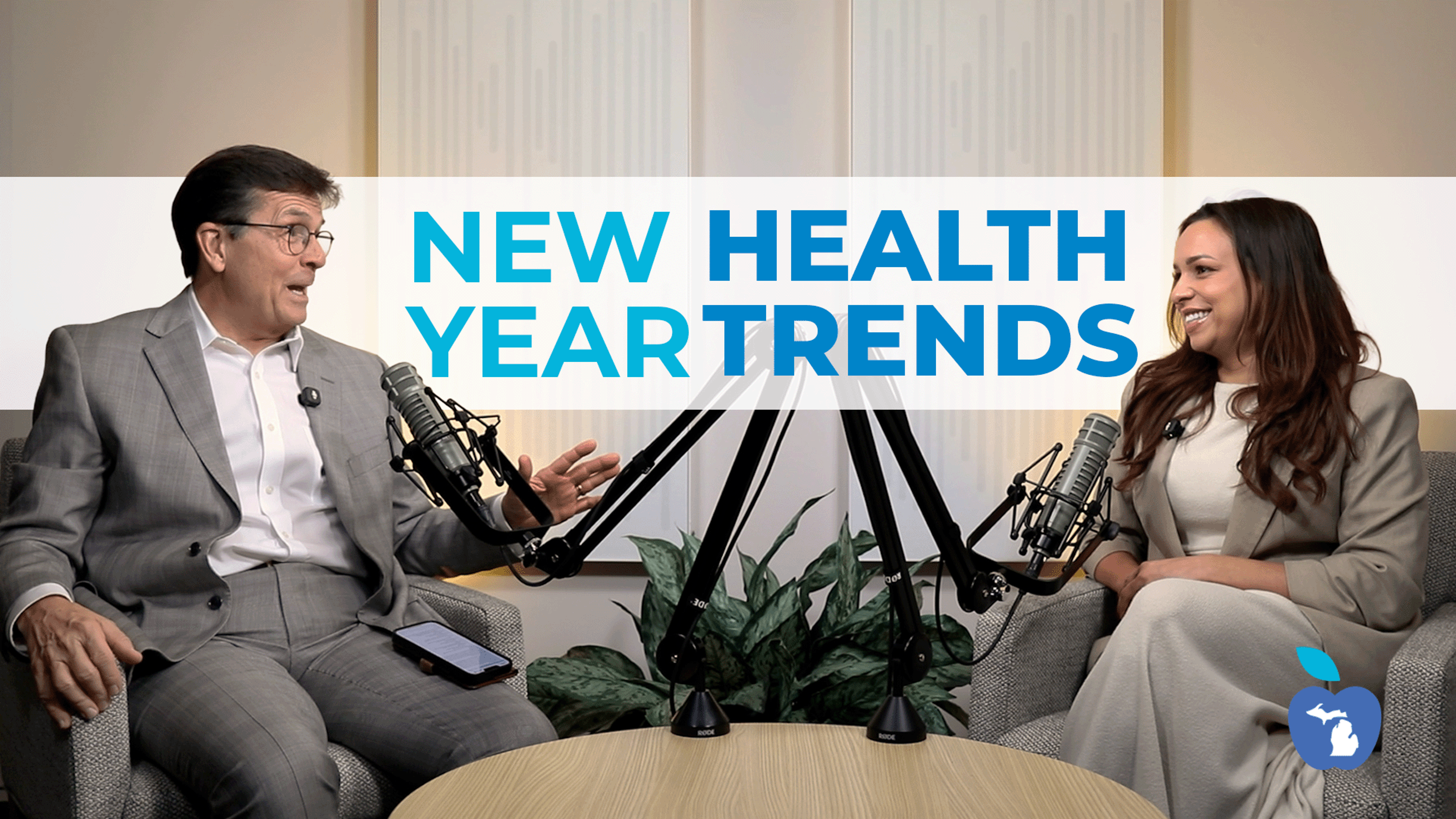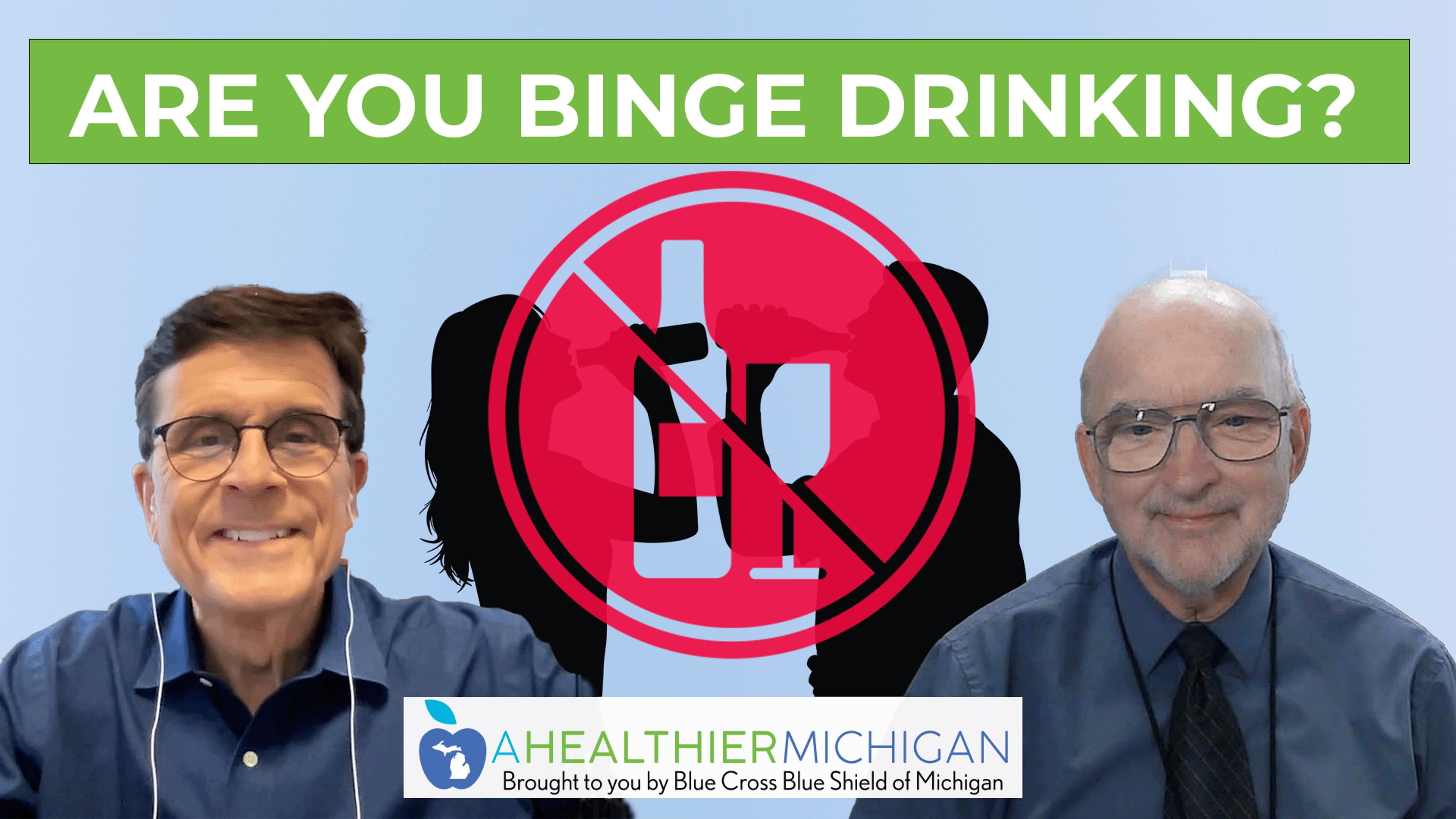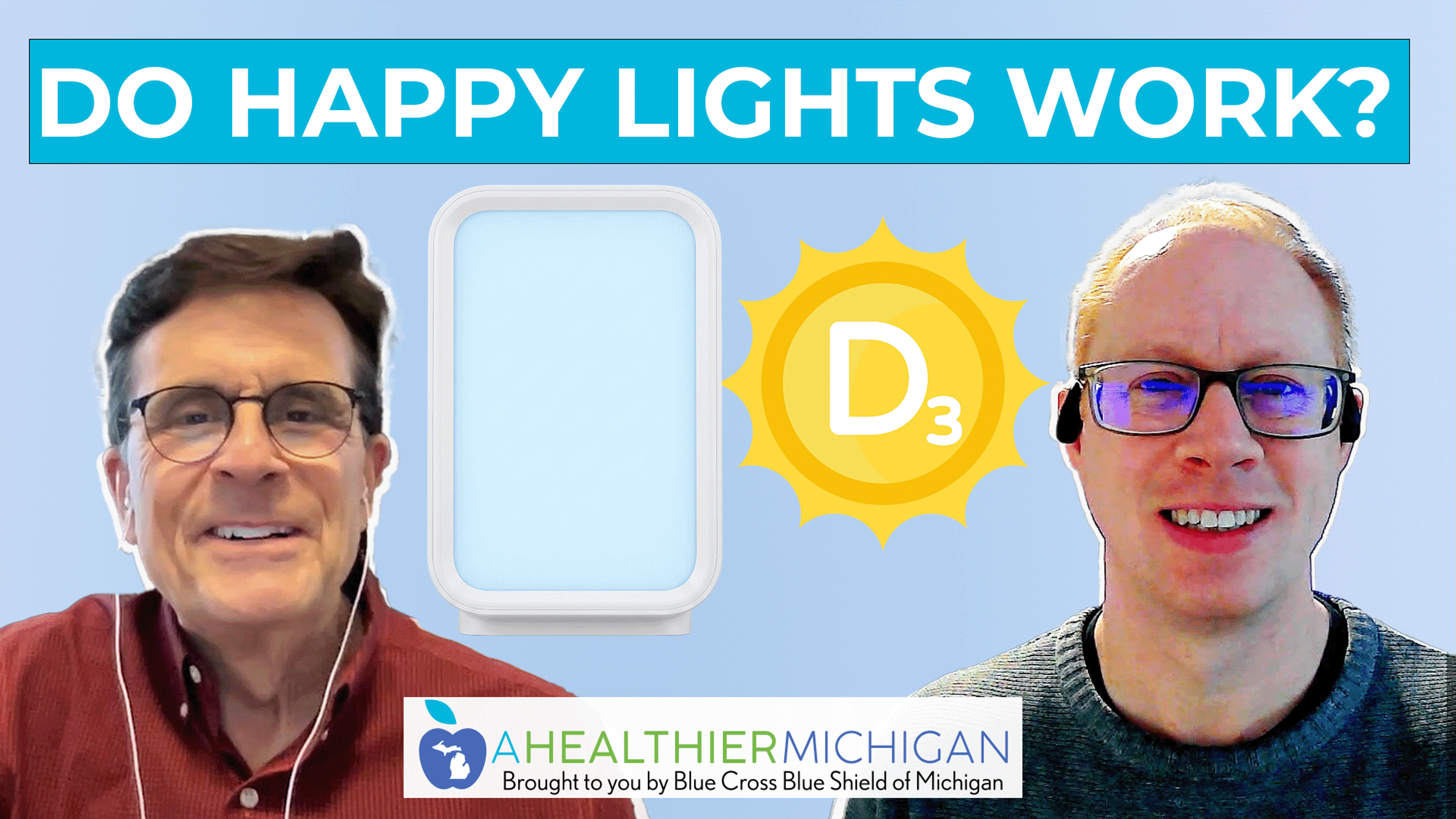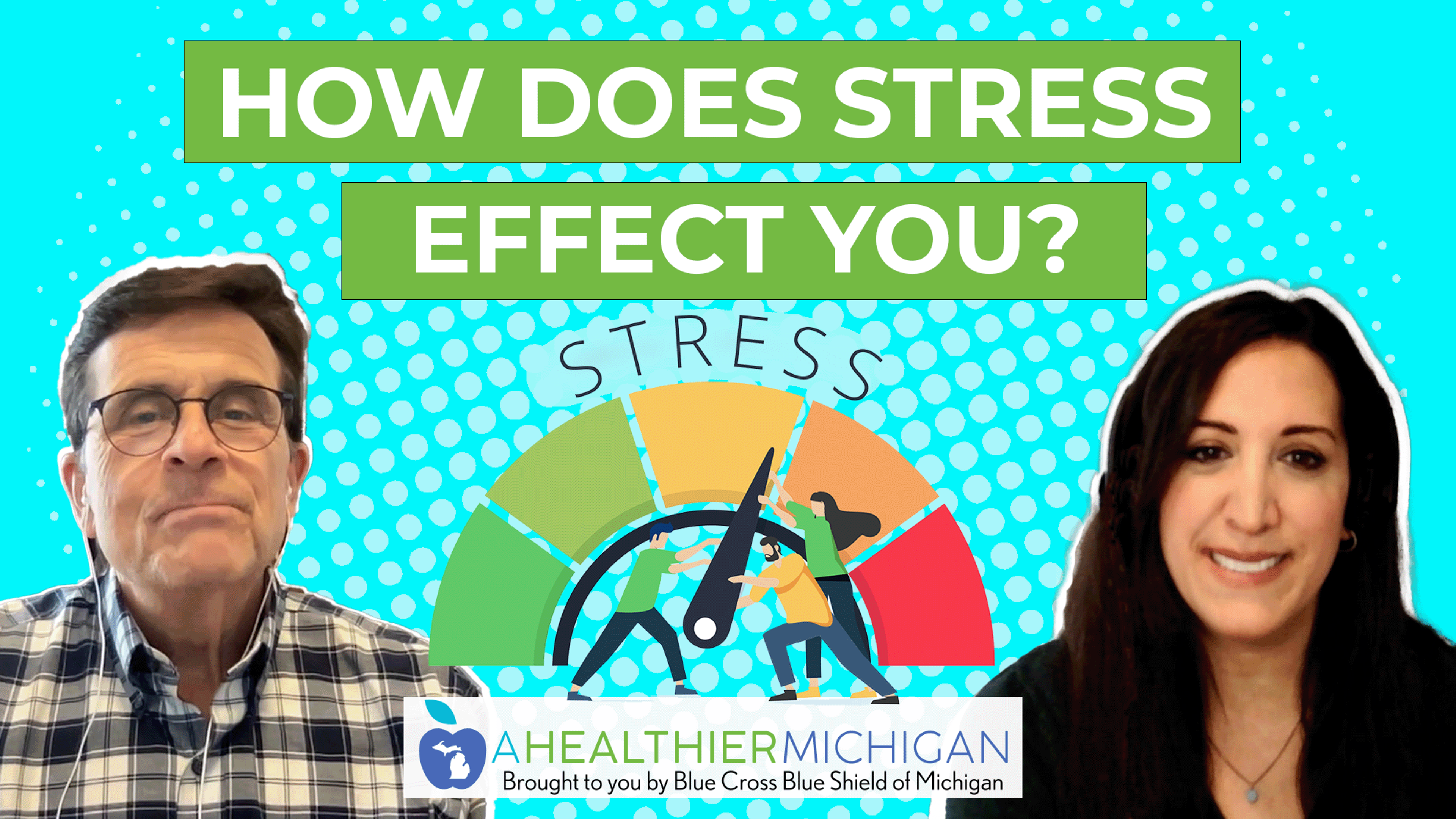How to Not Let Work Become Your Identity
| 1 min read

00:00
00:00
About the Show
On this episode, Chuck Gaidica is joined by Senior Health Care Analyst for Blue Cross Blue Shield of Michigan, Josh McCullough. Together, they explore how to spot signs that work has become your identity.
In this episode of A Healthier Michigan Podcast, we explore the importance of seeking balance, setting boundaries, and getting input from trusted support networks to prevent work from overshadowing other meaningful aspects of life.
Transcript
Here is the full transcript of this episode. You can listen to the audio version on streaming platforms or watch on YouTube.
Chuck Gaidica:
Is your job title defining your entire identity? This is A Healthier Michigan podcast, Episode 168. And coming up, we discuss how to break free from the blur of work life and find fulfillment beyond the nine to five grind.
Is your job title defining your entire identity? This is A Healthier Michigan podcast, Episode 168. And coming up, we discuss how to break free from the blur of work life and find fulfillment beyond the nine to five grind.
Welcome to A Healthier Michigan podcast, the podcast dedicated to navigating how we can improve our health and well-being through small, healthy habits we can start implementing right now. I'm your host, Chuck Gaidica, and every other week we'll sit down with a certified expert. We discuss topics that cover nutrition, fitness, and more. And on this episode we're exploring how to spot signs that work may have become your identity. It happens maybe more easily than we think. It just is a thing. And then, how does that tie to our physical and mental health? And we'll also try to uncover some strategies to build a more balanced life beyond the office, or whatever work life is. With me today, is Senior Healthcare Analyst for Blue Cross Blue Shield of Michigan, Josh McCullough. Josh, it's good to see you.
Josh McCullough:
Likewise. Thank you for having me.
Chuck Gaidica:
Yeah, sure thing. At times it seems like career success or just a career itself or a job is equated to personal fulfillment. And it makes sense, right? We go do something for somebody and they give us money in return, and that becomes part of identity. And work is a good thing. It gets us up and going, it helps us provide for ourselves and our family. But then we can sometimes, maybe it's a trap, maybe it's not, fall into a job title or a position. Or I'm running a big giant company and then tomorrow I got downsized out and then I'm not.
So these boundaries between work and life it seems, get blurred at times, especially in recent years with the rise of remote work, making it maybe harder to separate who we are from what we do. And then here comes this next stuff where your career can overshadow aspects of life, maybe even your health. So let's ask the question, how can we take back a sense of self that isn't solely tied to what we do for a living?
Josh McCullough:
I think that, building on the last time you and I spoke, I think that part of it is identifying some of our values. What is it that I value? And I don't mean I value my guitar. My guitar has a certain monetary worth or my car has a certain monetary worth. But for working and being paid to do it, what do I want to accomplish with that? If I have hobbies, what is it about those that speak to me? And then how can I engage in those? If I don't know what I like, maybe part of it is sampling. There's nothing wrong with that. Try a little bit of this, try a little bit of that.
But ultimately kind of understanding that really, we're not living to work, we're working to live. The job pays us money that enables us to keep the roof over our heads, keep the food on our table, keep the lights on. Hopefully enables us to engage in some leisure work because it's kind of like the gas tank for work. You can only draw it down so much before then you have to draw into the reserves of, "Well, I'm going to take time from leisure activity. I'm going to take time from relaxing. I'm going to take time from recharging." You can only draw on those reserves for so long and then you're running on empty.
Chuck Gaidica:
So why do you find it currently, or even in your past practice in places that you've been, why do people struggle with separating this idea of personal identity from professional identity? I would assume right away, and I'll just take me for an example. I did something very similar in my professional life for nearly 40 years. Well, that's part of it, right? I mean, I just did it so long, I wasn't moving from one thing to another thing. I was kind of doing the same thing and that just gets ingrained in me. Right?
Josh McCullough:
Well, when you talk about ingrained, I think part of it is for so long we've had this kind of philosophy of work hard, play hard. That we should devote as much as we can to our job, to the company, to the career. And then that will pay off somehow. Maybe not today, maybe not next week, but maybe sometime in the future. Maybe in retirement, I'll be able to then enjoy life. I mean, there's entire industries that are built on that philosophy.
The financial sector, people become junior stockbrokers, junior analysts, whatever. And they work insane hours, 80 hour weeks, 90 hour weeks, hoping that eventually that will pay off and I'll be able to relax and settle down a little bit.
The legal industry. Lawyers may join practices hoping one day to become partner, which is a big goal in that practice. They have to work a lot, bill a lot, really put their nose to the grindstone to do that for the hope that it'll pay off in the future. And then even in healthcare. I'm a psychologist by training. Doctors, nurses, even when they are going to school to learn how to do that, they get put through the ringer of working long hours and getting little sleep and studying and working and all these things to one day do what it is they want to do to be their best to help people.
I'm not saying that we limit those types of jobs to just six hours, you clock in, you clock out so that's just not realistic. But there is a trade-off. I mean, I don't think any of us would want to have our finances managed by someone who is running on empty, have our health in the hands of someone who is running on complete empty, have our lawyer go into bat for us when they have little sleep. Their attention is not great because they're so worn out by the demands of what they do. It's called burnout. I think we've all experienced it one way, shape, or form when we're putting much more into our job than we're necessarily getting out of it, in terms of physical and emotional reward.
You mentioned that 40-year career and how that habit goes forward, even after you've retired from it. People get into some of these lines of work 'cause they want to help people. You wanted to inform people, make sure people what was going on in their community. People want to become doctors, nurses, therapists, whatever to help people. And there is some trade-off with that. But if it's all give and no take, eventually that's just going to work against us.
Chuck Gaidica:
Well, and yet I've met people who are doctors, pick any number of applications here, who are driven. They're at or beyond the "typical" retirement age. They keep on going. They feel like they're moving at 110, 120% because of the nature of that business, if you will. And they can't get off the treadmill. They can't do it. So psychologically, does that become a thing that continues, whether it's the reward because I'm making a great living at it, or it's just the high I get from the intensity of the job? Some people can't step off the treadmill and find that time to bring work-life balance into a center. So, what have you seen in your past and how can you advise us psychologically the implications of finding a way to dial it down so you're not burned out, and then maybe ways to step aside from a career if you've left it?
Josh McCullough:
Yeah. I think part of it is setting the stage early. Both of my parents are retired and they found things after retirement to help keep them busy, both part-time job and leisure activity. And I think the idea of when I put in my 30 or 40 years in my career and then I retire, then I'll figure out what it is I like to do. It's not just jumping into a pool to see if you can swim, it's jumping off a cliff to see if you can fly. That's a big lifestyle change.
I think setting the groundwork early for trying some things, thinking about what I might like to do, kind of letting your mind go, "If I had free time, what would I like to do and how can I start doing some of that now?" Trusting your friends and your family. If they come to you and say, "Josh, you're kind of burning the candle at both ends and in the middle. You're looking a little ragged, little rundown. Maybe it's time to pull back a little bit.", finding some ways to do that. It may not be easy, necessarily.
I think of doctors who are going through medical school and they're doing their residence and they're doing their training. You can't just say, "Wait, I need to take off a little early today." Some of that comes built in with certain careers, but starting to think now, what can I do? Even small steps to claim back some time for myself. And then also set the groundwork for in the future when I don't have to work so hard, what can I do to rebalance?
Because you talk about, if all I've got is work and I've never thought about what it is I like to do for fun or I do it so infrequently, even when you retire, that's going to be a huge gap left in your life. And that can lead to, I've seen many times, unfortunately, people develop difficulties with depression, anxiety, substance use. Old haunts come back to haunt them when they retire, because when they were working so much, they didn't have time to really think and worry. Now that all they have is free time, these troubles come into play.
Chuck Gaidica:
Yeah, it's interesting because I think I've personally witnessed people that are in my life or neighbors who have retired. And again, what if God gives them another 30 years of life? How much golf can you play? Right? And so-
Josh McCullough:
Right, right.
Chuck Gaidica:
... I'm not a golfer, so I'm not disparaging golf, I'm just using it-
Josh McCullough:
Nor am I.
Chuck Gaidica:
... as an example. It's just, I think it's a sense of purpose and trying to find a passion, whether it's while you're currently working, what is it that can be a great distraction for you, something that gives you time, or even if it's quiet time? And then this idea of shifting your identity to some other place.
And I love what you're saying about Bob Buford. He's a late author and of a movement, author of a movement called Half Time, and he wrote a book, Half Time, Moving Your Life From Success to Significance. It kind of talks about that other half of life that comes not necessarily even after you retire. And I related to that. I read the book in my 40s and I thought, "Yeah. Now, I don't think I have another half. The math doesn't work out." But there's this idea of what he coined as small cost probes, what you're saying. Dip your toe in the water and see what other things could charge you up. Or maybe you've always wanted to go help people donate blood or whatever it is. But maybe don't jump in the deep end of the pool, just find these small cost probes until you find the right one. That's a great way to look at it.
Josh McCullough:
Yeah, and it's interesting. I think of my father specifically because he had a love for animals, absolutely loved animals. The most shy or scared animal would just curl right up to him. And he had dogs and cats and things like that. But when he retired, part of what he did was volunteer time at a local animal shelter. It's not realistic for him or a drive for him to start his own. And that would be an incredible way to jump in with both feet. But to say, "How can I contact that value of I want to give of myself, be of service to other people, and also help animals? I can help someone that's already there or an organization that's already there."
I think that oftentimes, we tend to discount the small steps, especially if we're so used to working high intensity. I've been the partner, been the doctor, the chief of staff, the paramedic, the EMS running into crisis situations. If I'm not all or nothing, I'm failing. But there's nothing wrong with splitting time. A little bit of part-time work here, part-time volunteer there, or tinkering around with a hobby here. Even if you don't reach these heights of the different marks that we see out in public or set for ourselves, nothing wrong with dipping our toe in the water. That could also be a way to help identify what it is that we love to do.
I used to work with a couple of folks who were occupational therapists at one of the practices I worked at. And they said so many times people think of occupation as job. Occupational, job. We just have that connection in our heads. But occupation is being involved in something that is meaningful, volunteer work, hobby work, vocation, a job, things like that. And there's got to be a little bit of room on the plate for all of those things.
Chuck Gaidica:
And it's interesting too because when you try to find a way to set boundaries, whether you're that doctor that's running and gunning at 110% or the paramedic or you really have a relaxed life, you have a great job, you have a great vocation. You haven't quite found your vocation, your hobby yet, but somehow we've all got to find healthful ways of setting boundaries in our work and professional life. How do you suggest we do that, pointing obviously, directly to better mental health and overall, well-being? How do we set boundaries?
Josh McCullough:
I think part of it is getting input from some of our supports, our friends, our family, people that are close to us. Especially in some of these high-crisis, go-go-go type of jobs that people can have, we often think, "I have got to solve this myself." And we so quickly become an island unto ourselves. But really, I tend to think of our friends and family almost like a safety net, in a sense. If we go to the circus and we see the high-wire performers, they've got a safety net below them to catch them if they fall, something they can depend on. It's not a one-rope safety net. It's made up of a lot of strong ropes to catch us when we fall. Our friends and family are like that.
So I think part of it may start with, "Here's what I'm thinking. What are you seeing? I think I'm doing okay, but what do you think?" Or, "You've come to me a few times and said that, yeah, it looks like I'm kind of burnt out or struggling here. I'm not quite seeing it. But what do you see that makes you say that?" Because we can so often go with blinders on in our own lives, humming along day to day, doing the same thing. And people outside of us have a much wider view of what's going on. So, we may talk with them and say, "What are you seeing? Oh, okay, I'm working too much. Maybe I need to take a step back. Is it possible for me to do that?"
Again, a medical student going through their residency, it may not be realistic for them to be able to say, "I just want to work eight-hour days. I'm just going to work Monday through Friday." But there may come a time where we talk to our supports and say, "Is now a time I can do that, one way or another? Can I work a little less hours? Can I shift some of my time? Can I work remotely depending on the job I've got, rather than making a big commute every day? And then with that time", dipping our toe in the water, "what would I like to try to do? Almost like if I had the genie's lamp, if I could rub the genie's lamp, what could I accomplish? What would I like to do?" And then figuring out a plan to get there. Even small steps like we've talked about here.
And I think the biggest thing then is to be able to talk to people who are employing us and say, "I need to make some sort of change. I'd like to do this, do that. What is realistic to do?" And to come to a sort of middle ground. Hopefully, people are employed at a place where that is possible. We've all heard horror stories of places where they react quite negatively, if people try and set boundaries.
I think that's a big red flag. If you don't have anyone that you feel you can go to and talk openly and say, "Hey, kind of burning the candle at both ends and the middle here. How can I reconfigure things so that I'm still useful and productive and of value, but I'm not going to run myself into the ground and then I'm no longer helpful for the company?" Maybe we practice some of those conversations with people that we trust.
Chuck Gaidica:
I think what you're saying about people that we trust, it's not lost on me that here we are in this political season. Right? There isn't one person that's going to be on a ballot that we're going to see that doesn't have a small kitchen cabinet of people, right? This is forever and a day where somebody, you talk to your wife, you talk to your best friend, you have this kitchen cabinet that you don't always think about. They don't all come and sit at your dining room table and tell you, "Hey, Josh, go run for president." They don't do that.
Josh McCullough:
That would be horrible.
Chuck Gaidica:
I'm not so sure. But if you were to have your little kitchen cabinet, just think about whether they're in California and you're in Michigan, or you can get to them with a phone call. Whatever it is, that's a lot of wisdom to try to find a spouse, your priest, your pastor, your neighbor, your best buddy from high school, whoever it is to try to say, "Listen, this is what I'm thinking." And the reason I like this is because I've had some wacky ideas in my life that weren't necessarily re-crafting of my life. But if I bring them to somebody who I trust, who will speak truth to what I'm saying, I'm looking for someone who says, "Well, that's the craziest idea I've ever... I wouldn't do that if you paid me." Right? I mean, sometimes you just need that person to say that stuff too.
Josh McCullough:
Right. I think also from those conversations, you can drill down and say, "What is it about this idea that speaks to me? What is it about this idea that really jazzes me up? Is there a way to contact some of that?" Whatever it may be. If it's this idea, I like it because it makes me of service to people. I like to be helpful to people. Or it's a skill that gets me around other people, or it's a way to express myself. And maybe we can find another way to contact that, those values, without the kind of wacky idea that may not pan out so well.
Chuck Gaidica:
I've had some wacky ones, so I can appreciate this whole thing you're talking about. Yeah.
Josh McCullough:
We all have.
Chuck Gaidica:
Yeah. Social connections and hobbies outside of work and play. This is something that can bring a balance to life, a sense of self. Right? Maybe a whole new perspective on something you're now good at. Or in my case, I'll come back to golf again. I have literally been asking friends or people I know of about my same age group, "Is it too late to learn how to play golf?" So some of them have said, "Well, whatever time you got left, you don't want to be that frustrated in life." Right? And they're golfers. They're saying this, "No, no, no. Don't even start. It's too late."
And then I've had other people say, "No, it's never too late." So of course for me, there's only one thing left to do, and that's to dip my toe in the water and see, do I really want to go out and be on a golf course for four or six hours or something? So, I've got to try it. But I think that there's that idea that sometimes finding a hobby, that avocation, we sometimes in life, I know I've tried this, to try to bring them together with my job. And it's okay. I've had to give myself some counsel. It's okay to have a job that I love, that I get paid for. And it's also okay to have playtime that I don't get paid for.
Josh McCullough:
Absolutely.
Chuck Gaidica:
And I have a hobby that I love. They don't have to come together. They can be totally separate, and that can be a healthful thing. So this balance of self, what other ways can we find balance outside of maybe pursuing a hobby? What would you suggest?
Josh McCullough:
Well, I think that there is nothing wrong with having some quiet time to kind of reflect. I think so often, we tend to want to enhance all these sorts of "positive emotions", my happiness, my joy, my fun, whatever. And we want to diminish or squash down these negative emotions, depression, anxiety, frustration, whatever it is. And I think a lot of people, even well-meaning mental health professionals, may accidentally spend a lot of time trying to turn away from those negative emotions. But I think there's a lot to be gained by kind of turning back to them and saying, "What are these emotions trying to do for me?" They're all trying to do something for us. They may just kind of come out sideways. Perhaps if I'm anxious, if I'm nervous, and whatever, maybe those emotions are trying to tell me something. Maybe I need to delve into that a little bit.
Seeking professional counsel one way, shape or form is not a bad idea for people that are really struggling. It's one thing to have personal connections with friends and family on your side. It's another to have a completely unbiased third party to help put some perspective into play. And there are more and more ways to do that these days with telehealth. Almost as if you and I were having a session over this video camera here, it's more accessible on one hand than ever. We don't have to necessarily make the drive, chunk out time, leave work early, whatever the case may be. We can have a conversation over the video camera here.
So, I think those are great ways to help build some more perspective and get that, what I call prosthetic thinking. I used to work with folks who had had brain injuries from auto accidents, and they may have to build in prosthetic memory. Back in the day, it used to be a palm pilot, if you remember those.
Chuck Gaidica:
Yeah.
Josh McCullough:
But now we have our cell phones. We have our calendar built in, we have our voice notes built in, we have our reminders built in, all in this wonderful gadget that helps us to not forget things. We can just as easily talk with folks one way or another and have sort of prosthetic executive functioning, prosthetic decision-making. You talk about building the kitchen cabinet of resources. Who else can I bring in to help me snuff things out and also help provide some sort of counsel when way, shape, or form? If I'm feeling off, feeling not myself, feeling down in the dumps, whatever the case would be to help kind of figure out what's going on. Rather than just say, "I'm just going to avoid these emotions." That can lead us down a whole other path of running away from things that are trying to help us inadvertently that we just don't... Popular culture says we shouldn't feel depressed, shouldn't feel anxious, shouldn't feel these emotions. We should get rid of them. I think we need to listen to them a bit more.
And I think that also the idea of keeping our hobby, our hobby, and not having to monetize it is, especially in today's day and age, very valuable. With TikTok and influencers and Facebook and all that, there's been this culture of, if I like to do something, I need to make money off it.
Chuck Gaidica:
Right.
Josh McCullough:
Not necessarily. And it's a rare person that can make a lot of money off of the thing they love, which can also poison the well of the thing you love too.
Chuck Gaidica:
Yeah. Well, as we wrap up, if we circle back to this idea of professional identity and kind of detaching the train from the caboose, from personal identity, what are your takeaways for everything we've talked about? Because there's so much great stuff in this episode, Josh.
Josh McCullough:
Something to take away should be that work is something that helps us live, not the other way around. It's kind of the old adage of, I don't think anyone on their deathbed has ever said, "Geez, I wish I worked more." Make sure that your needs are taken care of, just your basic biological needs. Am I getting enough sleep? Am I getting good enough nourishment and nutrition? We've got fulfillment in our life outside of the workday to help balance things out and recharge our batteries, so to speak. And if you notice, that's not the case. Taking steps as you can, to kind of help rebalance the lows so you're not suffering for it.
Chuck Gaidica:
Yeah. Good stuff. Well, Josh McCullough, it's good to see you again. Thanks.
Josh McCullough:
Likewise. Always good to see you.
Chuck Gaidica:
Yeah. Be well. Senior Healthcare Analyst for Blue Cross Blue Shield of Michigan, Josh McCullough, joined us today. We're glad you're here. Thanks for listening to A Healthier Michigan podcast, brought to you by Blue Cross Blue Shield of Michigan. If you like the show, you want to know more, you can check us out online at ahealthiermichigan.org/podcast. Or you can leave us a review or rating on Apple Podcast or Spotify. You can also get to us, you can follow us on Facebook, Instagram, or X. You can get new episodes, old episodes, we've got a YouTube channel. You can also subscribe to us on Apple Podcast, Spotify, YouTube, or your favorite podcast app. I'm Chuck Gaidica, be well.





